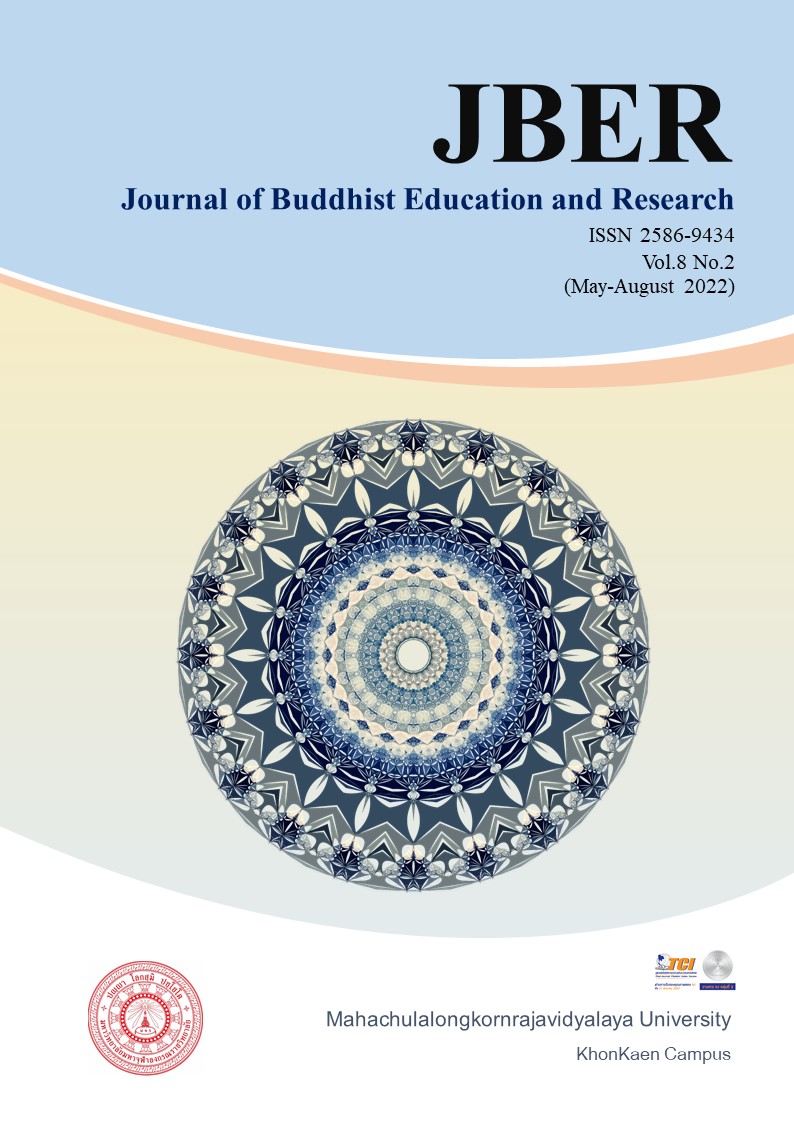การจัดการเรียนการสอนภาษาอังกฤษแนวใหม่ตามกรอบอ้างอิงความสามารถทางภาษาของสหภาพยุโรป ระดับมัธยมต้น.
คำสำคัญ:
บอร์ดเกม, กิจกรรมการเรียนรู้, ความสามารถในการพูดภาษาอังกฤษบทคัดย่อ
การวิจัยครั้งนี้มีจุดมุ่งหมายเพื่อ 1) สร้างและหาประสิทธิภาพของกิจกรรมการเรียนรู้ภาษาอังกฤษโดยใช้บอร์ดเกมเพื่อเสริมสร้างความสามารถในการพูดภาษาอังกฤษ สำหรับนักเรียนชั้นมัธยมศึกษาปีที่ 1 ตามเกณฑ์ 75/75 2) เปรียบเทียบความสามารถในการการพูดภาษาอังกฤษของนักเรียนหลังเรียนโดยใช้กิจกรรมการเรียนรู้ภาษาอังกฤษโดยใช้บอร์ดเกม กับเกณฑ์ร้อยละ 75 3) ศึกษาความพึงพอใจของนักเรียนชั้นมัธยมศึกษาปีที่ 1 ที่มีต่อกิจกรรมการเรียนรู้ภาษาอังกฤษโดยใช้บอร์ดเกม ดำเนินการวิจัยตามกระบวนการวิจัยและพัฒนาและพัฒนา (Research and Development) มีกลุ่มตัวอย่างเป็นนักเรียนชั้นมัธยมศึกษาปีที่ 1 ภาคเรียนที่ 2 ปีการศึกษา 2563 โรงเรียนวัดพร้าว จำนวน 20 คน โดยได้มาจากการสุ่มอย่างง่าย (Simple Random Sampling) เครื่องมือที่ใช้ในการวิจัย ได้แก่ กิจกรรมการเรียนรู้ภาษาอังกฤษโดยใช้บอร์ดเกม แบบทดสอบวัดความความสามารถในการพูดภาษาอังกฤษ และแบบประเมินความพึงพอใจ สถิติที่ใช้ในการวิเคราะห์ข้อมูล ได้แก่ ค่าร้อยละ ค่าเฉลี่ย ค่าส่วนเบี่ยงเบนมาตรฐาน และการทดสอบค่า t แบบหนึ่งกลุ่ม (t-test one sample)
ผลการวิจัยพบว่า
1. กิจกรรมการเรียนรู้ภาษาอังกฤษโดยใช้บอร์ดเกมเพื่อเสริมสร้างความสามารถในการพูด ภาษาอังกฤษ สำหรับนักเรียนชั้นมัธยมศึกษาปีที่ 1 มีประสิทธิภาพเท่ากับ 75.52/76.04 ซึ่งสูงกว่าเกณฑ์ 75/75
2. นักเรียนระดับชั้นมัธยมศึกษาปีที่ 1 มีความสามารถในการพูดภาษาอังกฤษหลังเรียน ด้วยกิจกรรมการเรียนรู้ภาษาอังกฤษโดยใช้บอร์ดเกม เพื่อเสริมสร้างความสามารถในการพูดภาษาอังกฤษ สำหรับนักเรียนชั้นมัธยมศึกษาปีที่ 1 สูงกว่าเกณฑ์ร้อยละ 75 อย่างมีนัยสำคัญทางสถิติที่ระดับ .05 และมีความพึงพอใจต่อกิจกรรม ภาพรวมอยู่ในระดับมาก
เอกสารอ้างอิง
ทิศนา แขมมณี. (2550). ศาสตร์การสอน: องค์ความรู้เพื่อการจัดกระบวนการเรียนรู้ที่มีคุณภาพ (พิมพ์ครั้งที่ 2). กรุงเทพฯ: ด่านสุนธราการพิมพ์.
นงสมร พงษ์พานิช. (2554). การศึกษาปัญหาของการพูดภาษาอังกฤษในการสื่อสารด้วยวาจาของนิสิต คณะวิทยาการจัดการ มหาวิทยาลัยเกษตรศาสตร์ วิทยาเขตศรีราชา.วารสารมนุษยศาสตร์. 18(1), 85-97.
บุญชม ศรีสะอาด. (2545). การวิจัยเบื้องต้น. (พิมพ์ครั้งที่ 6). กรุงเทพฯ : สุวิริยาศาสตร์.
ยุทธพงษ์ บุญภา. (2550). การพัฒนาทักษะการพูดภาษาอังกฤษ โดยใช้เกมสื่อสาร นักเรียนชั้นประถมศึกษาปี ที่ 5. วิทยานิพนธ์ สาขาวิชาหลักสูตรการสอน. มหาวิทยาลัยมหาสารคาม.
รัตนะ บัวสนธ์. (2552). การวิจัยและพัฒนานวัตกรรม. กรุงเทพฯ : โรงพิมพ์คำสมัย.
ล้วน สายยศ และอังคณา สายยศ. (2536). เทคนิคการวิจัยทางการศึกษา ภาควิชาการวัดผลและวิจัยการศึกษา. คณะศึกษาศาสตร์ : มหาวิทยาลัยศรีนครินทรวิโรฒ ประสานมิตร.
วราภรณ์ ลิ้มเปรมวัฒนา และกันตภณ ธรรมวัฒนา. (2560). พฤติกรรมในการเล่นเกมกระดานและองค์ประกอบของปัจจัยทางด้านผลกระทบ จากการเล่นเกมของวัยรุ่นในเขตกรุงเทพมหานคร. วารสารวิจัยสังคม, 40(2), 107-132.
สถาบันภาษาอังกฤษ. (2557). การจัดการเรียนการสอนภาษาอังกฤษแนวใหม่ตามกรอบอ้างอิงความสามารถทางภาษาของสหภาพยุโรป ระดับมัธยมต้น. กรุงเทพฯ: ม.ป.ท.
Carl R. Roger. (1976). A Theory of Personality with Schizophrenics and a Proposal for Its Empirical Investigation. Louisiana State University.
Clark, J.L.D. (1972). Foreign Language Testing: Theory and Practice. Philadephia Centre of Curriculum Development.
Esperanza Linares Linares. (2018). BOARD AND TABLE GAMES: A FUN WAY TO LEARN ENGLISH Enhancing Speaking through Board and Table Games in an EFL Classroom. Universidad Externado de Colombia School of Education.
Gardner, 1999; Rodilla, (2012). System thinking in action. Health Care Forum Journal, 36(4), 25-28.
Milagros Chao Castro (2016). Board-games as review lessons in English language teaching: useful resources for any level. Universidad de Santiago de Compostela.
Yong Mei Fung. (2016). Effects of Board Game on Speaking Ability of Low-proficiency ESL Learners. University Putra Malaysia.





